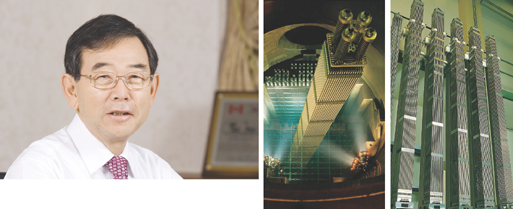KNF Strives to Expand Overseas Nuclear Fuel Business
Seeks the full-fledged export of Korean nuclear fuel products following the complete development of an advanced nuclear fuel called "X-Gen" in 2012

Korea Nuclear Fuel Co. Ltd. (KNF), Korea's sole nuclear fuel supplier, is striving to expand overseas business by making the most of experiences and expertise it has accumulated, KNF President and CEO Lee Ik-hwan said.
"KNF, which has so far gained global recognition for the production of high-quality nuclear fuel products, has been asked to collaborate not only in technology, but has also been doing business with nations that are trying to introduce nuclear power or ones that have stopped the construction of nuclear units," Lee said. KNF has been devoted to laying the foundation for the export of finished nuclear fuel products by operating an educational program for nations from Asia and other continents wanting to introduce nuclear power while cooperating and competing with the United States, European countries and other traditional nuclear powerhouses," he said.
Lee said, "We're going to push ahead with the full-fledged export of our own finished nuclear fuel products in 2012 or later when the development of an advanced nuclear fuel called X-Gen, designed to secure the original technology of PWR (Pressurized-Water Reactor) we are partially lacking, is complete." However, even before the completion of the X-Gen Project, he said, KNF is endeavoring to expand its overseas business while cooperating with competitors in diverse areas to pursue common interests in accordance with a need to invigorate the overseas business. KNF is throwing its heart and soul into giving a further shot in the arm to its business, as the world is expected to bask in the so-called second global nuclear power boom, but it cannot give business details about areas in which KNF is seeking to forge strategic alliances with foreign competitors ranging from finished nuclear fuel product design, manufacturing, parts and processing equipment to nuclear fuel testing, repairing and engineering services, he said.
KNF has not only succeeded in localizing all parts for producing nuclear fuel products through its support and technological guidance for Korean SMEs, but has also managed to create a nuclear fuel parts exporting industry, selling about $10 million in nuclear fuel parts to the United States and other traditional nuclear powerhouses.
Concerning the significance of nuclear power as the nation's future energy, Lee said, "Clean energy self-sufficiency has become an essential issue determining the rise and fall of a nation in the wake of crude oil price hikes and international environmental restrictions, and for Korea, a nation with an absolute shortage of natural resources, the reality is stark: no definite alternative options except nuclear power to pursue low-carbon, green growth. Korea also needs to pull out all the stops to develop wind, photovotaics, bio energy and other new and renewable energy sources, but it has its back against the wall in ensuring large amounts of energy immediately due to environmental conditions and a lack of infrastructure.
Given the reality of the nation, which depends on foreign imports for 97 percent of its total energy needs, paying an equivalent of $100 billion annually, he said, nuclear power technology self-sufficiency has an immense impact on securing a stable supply of national energy, and in the heart of that, in essence, is nuclear fuel.
Asked about public acceptance of nuclear power, Lee said. "The main reason behind public distrust is a lack of understanding of atomic power and publicity. These have left the general public with a lack of knowledge toward nuclear power exposed to groundless and unscientific allegations raised by some environmental groups harboring unwarranted misgivings toward nuclear power. Fortunately, however, the correct information about atomic power is available to the public. I understand that the public distrust toward atomic power has decreased quite a lot." He pointed out that the answer for raising trust toward the safety of nuclear power comes from quality management, adding that safety-related quality management systems and quality management activities are an essential part of its survival and evolution and the beginning and end of securing the safety of nuclear power.
"The Korean nuclear power industry boasts the world's top-level nuclear power utilization, beating the United States with the highest capacity factor of 93.4 percent in 2008, and this is owed to the excellent operational capability of Korea Hydro and Nuclear Power Co. (KHNP), combined with the excellent quality of the nuclear fuel. As Korea is recognized for more diverse and rich experience and a more competitive edge than any other country across the world, the issue of managing spent nuclear fuel will have to be handled in this context," he said.
"KNF is a public enterprise, established in 1982 with the goal of localizing nuclear fuel for domestic nuclear power units. The nuclear power industry accounts for some 36 percent of the nation's total power generation, and all nuclear fuel required in the process is fully supplied by KNF, which has successfully localized it," he said. nw
(left)KNF President and CEO Lee Ik-hwan. KNF is devoting its efforts to acquire all original technologies related to the manufacturing of nuclear fuel products.
3Fl, 292-47, Shindang 6-dong, Chung-gu, Seoul, Korea 100-456
Tel : 82-2-2235-6114 / Fax : 82-2-2235-0799